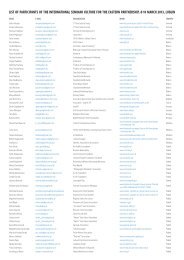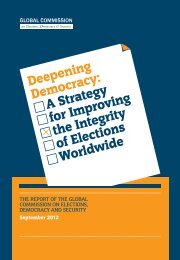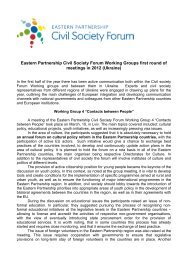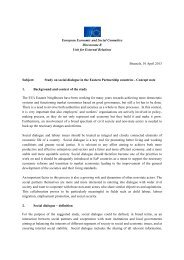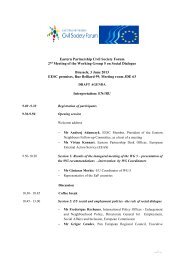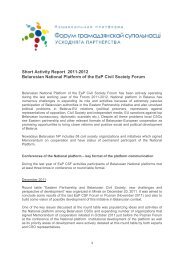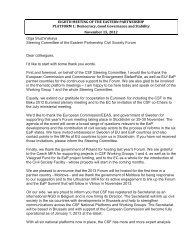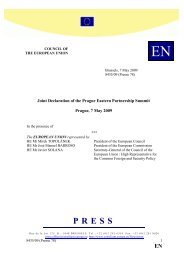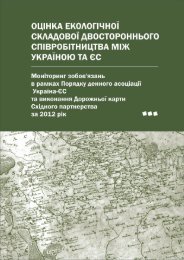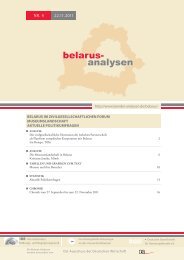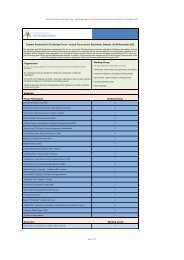Non-formal education - Eastern Partnership Civil Society Forum
Non-formal education - Eastern Partnership Civil Society Forum
Non-formal education - Eastern Partnership Civil Society Forum
You also want an ePaper? Increase the reach of your titles
YUMPU automatically turns print PDFs into web optimized ePapers that Google loves.
Adult <strong>education</strong> provides familiarization of citizens in science and culture, helping to adapt<br />
to changes in society and the development of professionalism through continuing <strong>education</strong>. Adult<br />
<strong>education</strong> includes various forms of learning and self-<strong>education</strong> (day, evening, part-time, distance, etc.)<br />
and performs individual or contract basis in various government and private institutions: universities,<br />
institutions of culture, open universities, houses of culture, folk art schools, clubs, associations, courses<br />
at businesses (Law on Education, 1995, Article 35 paragraph (5) changed ZP107-XVI of 16.05.08,<br />
MO107-109/20.06.08 Art .417).<br />
Significant place in the system, definition, implementation, and the philosophy of non-<strong>formal</strong><br />
<strong>education</strong> in Moldova is given to extra-curricular <strong>education</strong> of children and youth. This is reflected<br />
both in public documents, and the documents of an <strong>education</strong>al nature – in the curriculum courses for<br />
teaching specialties 42 .<br />
In accordance with Article 34 of the Law on Education, “Education at all levels and stages completed<br />
extracurricular activities aimed at the development of individual skills and aptitudes, interests and meet<br />
the different needs of the individual. Extracurricular activities include scientific, cultural, artistic, sports,<br />
tourism, technical and application areas. Additional <strong>education</strong> is carried out in groups and individually in<br />
various extracurricular institutions (clubs, palaces of pre-school children and students, school camps,<br />
sports and tourist centers, recreation centers, etc.), as well as in schools. In Moldova, there are 47 houses<br />
and 18 children’s art creative centers of different directions (artistic and aesthetic, scientific, technical,<br />
environmental, biological, sports and recreation, tourism and local history, socio-pedagogical) where<br />
are about 42 thousand children (about 9% of pupils). An important role in further <strong>education</strong> music, art<br />
(107) and sports schools (86) have with an enrollment of about 49,000 children and adolescents. In<br />
the department of social partners, the central and local governments are there are about 160 children’s<br />
summer camps which about 74% of children aged 7 to 16 years come to relax every year in 43 .<br />
In order to develop activities in non-<strong>formal</strong> and out of school <strong>education</strong> 2008 was proclaimed the<br />
Year of Youth, National Center to children and young people was open, which was an <strong>education</strong>almethodical<br />
institution designed to promote the development and implementation of state policy in<br />
the field of <strong>education</strong> of children and youth, and to provide methodological and logistical support for<br />
institutions and members of the public, service providers and non-<strong>formal</strong> adult <strong>education</strong>.<br />
Despite the well-developed reality,non-<strong>formal</strong> <strong>education</strong> of children, youth, and adults today is not<br />
the concept of an integrated non-<strong>formal</strong> <strong>education</strong>in the Republic of Moldova.<br />
Some policy documents of recent years mention sporadically some attempts of interpretation of<br />
non-<strong>formal</strong> <strong>education</strong>. For example, in the list of measuresof the National Development Strategy for<br />
2008-2011 chapter 4.3.1.said to create an educated workforce to keep competitive throughout the<br />
active life, and paragraph (v) recommended “the authorization and monitoring of <strong>education</strong>al services<br />
and the assessment of competence centers in non-<strong>formal</strong> <strong>education</strong> (including adults).” 44<br />
In 2008, a draft Strategy to upgrade non-<strong>formal</strong> <strong>education</strong> in the Republic of Moldova 45 was prepared,<br />
but never adopted. This project had a relative character, because did not provide horizontal and vertical<br />
integration of forms of <strong>education</strong>, its target group were children and young people, and non-<strong>formal</strong> adult<br />
<strong>education</strong> remained outside the document.<br />
Another attempt to enter the term “non-<strong>formal</strong> <strong>education</strong>” into <strong>formal</strong> <strong>education</strong>al setting was a<br />
project of the Education Code, submitted to public comment in April, 2010. In the third chapter of<br />
the document there are interpretation of basic concepts of the project, defines non-<strong>formal</strong> <strong>education</strong><br />
as “<strong>education</strong>al / development activities, in<strong>formal</strong>ly engineered beyond the didactic process (circles,<br />
bands, clubs, camps, competitions, field trips, conferences, and meetings, exhibitions, etc.) made by<br />
specialized teaching staff (teachers, class teachers, counselors, psychologists, methodists, etc.). It<br />
should be noted that, in consequence, in the draft Code non-<strong>formal</strong> <strong>education</strong> sector is not outlinedwith<br />
its significance and value.<br />
42<br />
http://www.upsc.md/_Plan_Studii/PEDAGOGIE/F_P_I_P/PIP%20si%20l.%20franceza/anul%20IV/sem7/F.07.A.045.pdf<br />
43<br />
по данным Национального Бюро Статистики (далее,НБС) , www.statistica.md<br />
44<br />
http://mpsfc.gov.md/file/egalitategen/str_nat_dez_md.pdf<br />
45<br />
ro.scribd.com<br />
65



